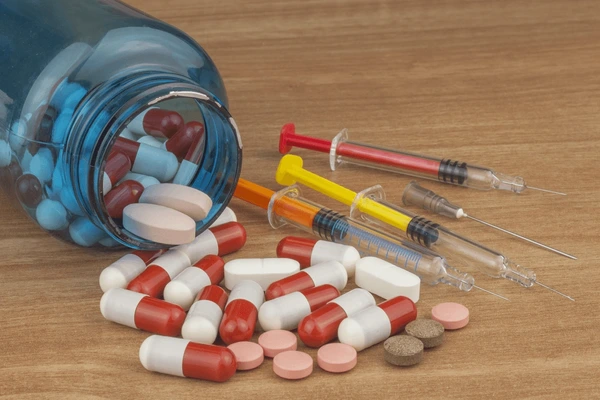Anabolic steroids have gained notoriety for their ability to enhance muscle growth, athletic performance, and physical appearance. However, their use comes with significant risks, particularly for the endocrine system. The endocrine system is a network of glands responsible for producing hormones that regulate vital functions, including growth, metabolism, reproduction, and mood. Understanding the long-term effects of steroid use on this intricate system is crucial for those considering or currently using anabolic steroids.
What Are Anabolic Steroids?
Anabolic-androgenic steroids (AAS) are synthetic versions of testosterone, the primary male sex hormone. These substances are used medically to treat conditions like delayed puberty or muscle wasting in chronic illnesses. In bodybuilding and sports, they are often abused to accelerate muscle growth and enhance performance.
While short-term steroid use can bring visible physical benefits, prolonged use disrupts the natural hormonal balance, leading to potentially irreversible damage to the endocrine system.
The Role of the Endocrine System
The endocrine system includes several glands, such as the hypothalamus, pituitary gland, adrenal glands, thyroid gland, and gonads (testes in men, ovaries in women). These glands secrete hormones that:
- Regulate growth and development.
- Control metabolism and energy levels.
- Manage reproductive functions.
- Maintain mood and stress responses.
Steroid abuse interferes with the endocrine system’s ability to function properly, causing a cascade of hormonal imbalances that can persist long after steroid use has stopped.
How Steroids Affect the Endocrine System
1. Disruption of the Hypothalamic-Pituitary-Gonadal (HPG) Axis
The HPG axis is a critical hormonal pathway that regulates testosterone production. When anabolic steroids are introduced into the body, they suppress the natural production of testosterone by:
- Inhibiting the hypothalamus: Steroids signal the hypothalamus to reduce gonadotropin-releasing hormone (GnRH) production.
- Suppressing the pituitary gland: Lower GnRH levels cause the pituitary gland to decrease luteinizing hormone (LH) and follicle-stimulating hormone (FSH) production, which are essential for testosterone synthesis.
This suppression results in testicular shrinkage, decreased sperm production, and infertility in men. In women, it can lead to disrupted menstrual cycles and decreased ovarian function.
2. Permanent Testosterone Suppression
Prolonged steroid use can cause lasting damage to the body’s ability to produce testosterone naturally. Post-cycle therapy (PCT) aims to restore hormonal balance, but some users experience persistent hypogonadism, a condition marked by chronically low testosterone levels.
3. Hormonal Imbalances
Excessive steroid use can increase estrogen levels through aromatization, a process where the body converts testosterone into estrogen. This imbalance can lead to:
- Gynecomastia (breast tissue growth in men).
- Water retention and bloating.
- Emotional instability, such as mood swings and depression.
In women, elevated testosterone levels caused by steroids may result in:
- Deepening of the voice.
- Excessive body and facial hair (hirsutism).
- Enlargement of the clitoris (clitoromegaly).
- Irregular or absent menstrual cycles.
Long-Term Consequences of Steroid Use on the Endocrine System
1. Testicular Atrophy and Infertility
One of the most visible effects of steroid use in men is testicular shrinkage, resulting from suppressed natural testosterone production. While this condition may be reversible with proper treatment, prolonged use increases the risk of permanent infertility.
2. Persistent Hypogonadism
Hypogonadism is a condition where the testes produce insufficient testosterone. This can lead to long-term symptoms, including:
- Low libido and erectile dysfunction.
- Loss of muscle mass and strength.
- Fatigue and lack of motivation.
- Depression and cognitive decline.
3. Adrenal Gland Dysfunction
Chronic steroid use can affect the adrenal glands, which produce cortisol, a hormone critical for stress response and metabolism. Steroids can suppress adrenal function, leading to adrenal insufficiency when steroid use stops abruptly. Symptoms include fatigue, weakness, and low blood pressure.
4. Increased Risk of Hormone-Related Cancers
Steroid abuse has been linked to an increased risk of hormone-related cancers, including prostate cancer in men and endometrial or breast cancer in women. While the connection is not fully understood, prolonged hormone imbalances may contribute to cellular changes that promote cancer development.
Mental and Emotional Impacts of Endocrine Disruption
The hormonal imbalances caused by steroid use can significantly impact mental health. Common effects include:
- Mood Swings: Rapid fluctuations in mood, including irritability and aggression (commonly referred to as “roid rage”).
- Depression: Low testosterone levels after steroid use can trigger depressive symptoms.
- Anxiety and Paranoia: Hormonal imbalances may increase anxiety and contribute to irrational thoughts or paranoia.
Recovering From Steroid-Induced Endocrine Damage
While some effects of steroid use on the endocrine system can be reversed, others may be permanent. Recovery depends on factors such as the duration of steroid use, the type and dosage of steroids taken, and individual genetic predisposition. Strategies for recovery include:
1. Post-Cycle Therapy (PCT)
PCT involves using medications like selective estrogen receptor modulators (SERMs) and human chorionic gonadotropin (hCG) to stimulate natural testosterone production and mitigate side effects. However, PCT is not always effective for severe or prolonged cases.
2. Medical Intervention
In cases of persistent hypogonadism or infertility, medical treatments such as testosterone replacement therapy (TRT) or fertility treatments may be necessary. These interventions can help restore hormonal balance and improve quality of life.
3. Lifestyle Modifications
Adopting a healthy lifestyle can support endocrine recovery. This includes:
- Eating a balanced diet rich in essential nutrients.
- Engaging in regular, moderate exercise.
- Reducing stress through mindfulness or relaxation techniques.
- Avoiding substances like alcohol and tobacco that can further harm the endocrine system.
Prevention: The Best Approach
The most effective way to avoid long-term damage to the endocrine system is to avoid anabolic steroid abuse altogether. For those seeking muscle growth and performance enhancement, safer alternatives include:
- Natural Supplements: Creatine, branched-chain amino acids (BCAAs), and protein powders are safe and effective for muscle building.
- Optimized Training Programs: Progressive overload and strategic periodization can yield impressive results without the need for steroids.
- Rest and Recovery: Adequate sleep and recovery time are crucial for hormonal balance and muscle repair.
Conclusion
Anabolic steroids can deliver rapid physical gains, but their long-term impact on the endocrine system is profound and often irreversible. Disrupting the delicate balance of hormones can lead to serious consequences, including infertility, hypogonadism, and mental health challenges. For those considering steroids, understanding these risks is essential for making informed decisions. Prioritizing natural methods of muscle building and performance enhancement ensures not only physical gains but also long-term health and well-being. Remember, no shortcut is worth compromising your endocrine health for life.
https://nida.nih.gov/research-topics/anabolic-steroids
https://medlineplus.gov/anabolicsteroids.html
https://academic.oup.com/edrv/article/35/3/341/2354633
https://pubmed.ncbi.nlm.nih.gov/24636400/
https://pubmed.ncbi.nlm.nih.gov/33887077/
https://pubmed.ncbi.nlm.nih.gov/21682835/
https://pubmed.ncbi.nlm.nih.gov/PMC10841926/
https://www.ncbi.nlm.nih.gov/books/NBK279105/
https://www.fda.gov/consumers/consumer-updates/caution-bodybuilding-products-can-be-risky
https://www.wada-ama.org/en/resources/world-anti-doping-code-and-international-standards/prohibited-list
https://nida.nih.gov/sites/default/files/rrsteroids_0.pdf
https://medlineplus.gov/steroids.html
https://pubmed.ncbi.nlm.nih.gov/23764075/
https://pubmed.ncbi.nlm.nih.gov/38711907/







